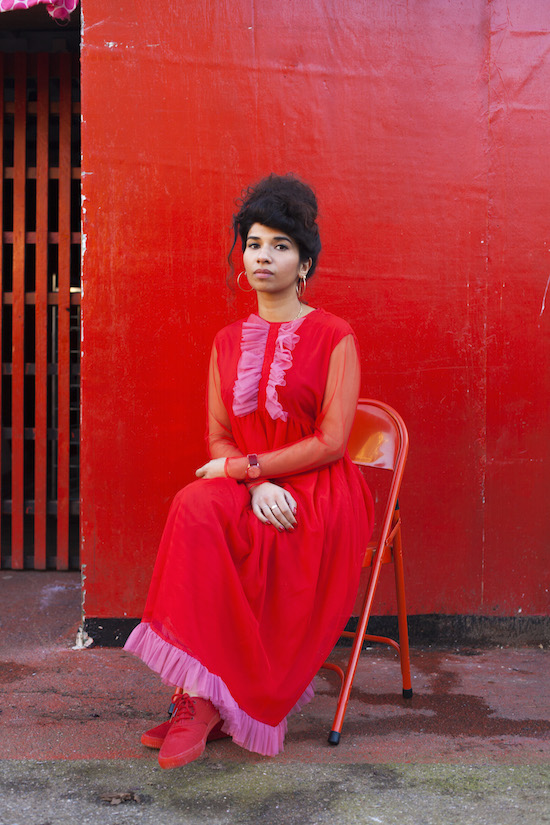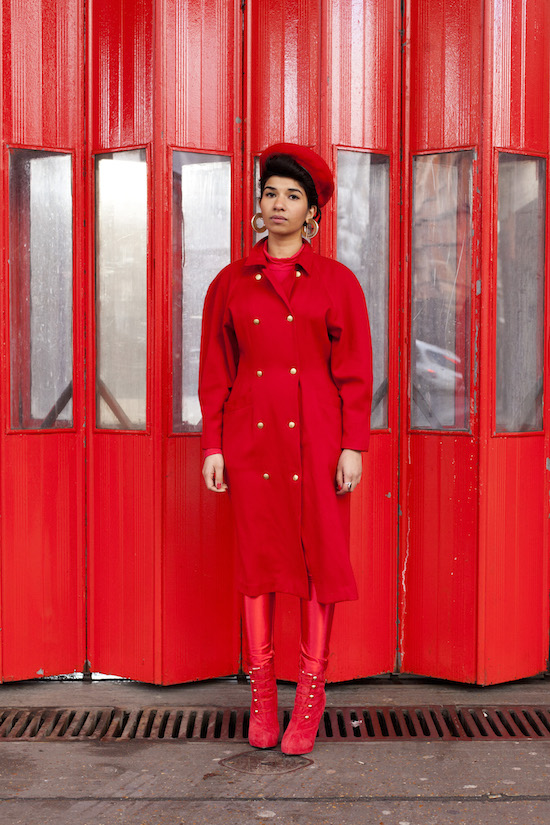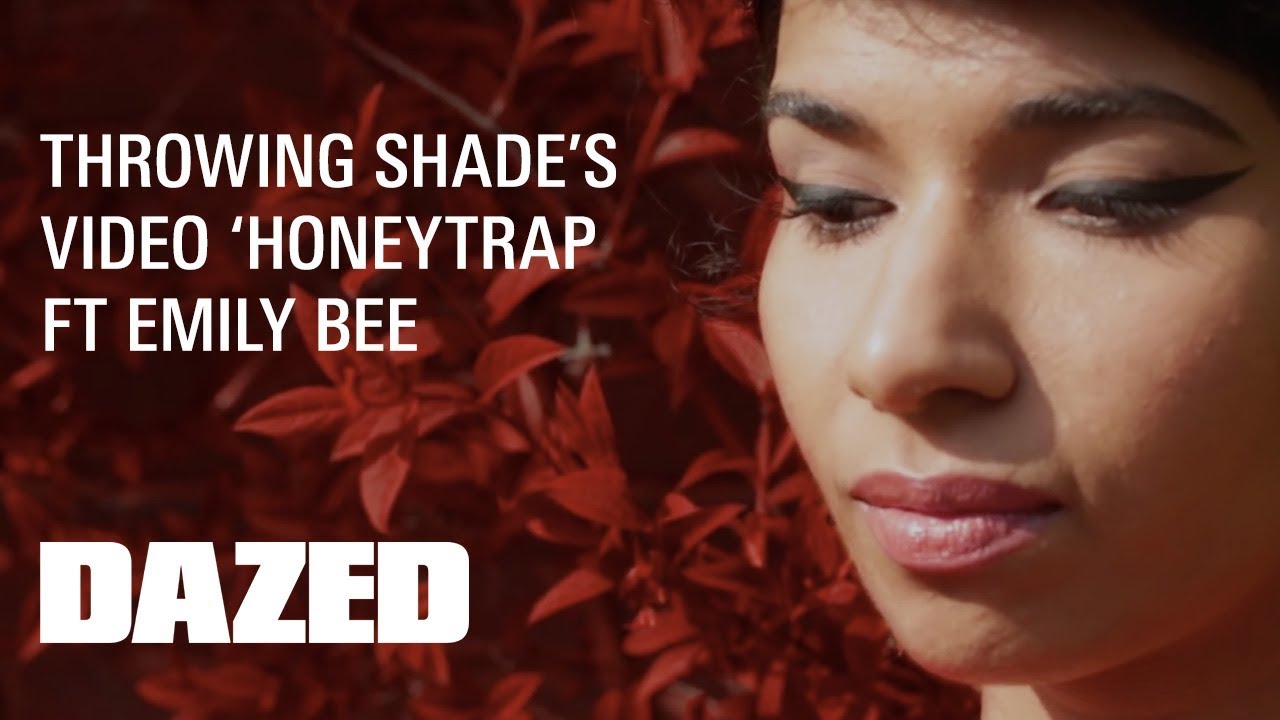Nabihah Iqbal, aka London-based producer Throwing Shade, is a harbinger of change for contemporary pop music. Emerging from the same origins as PC Music affiliates SOPHIE and felicita., her second EP, Fate Xclusive, which came out on No Pain In Pop in May, saw Iqbal bonding bubbling jingles with hollowed-out vocals to create beguiling soundscapes. Her records melt the margins of pop and techno, at once inventive and accessible. Speaking to her inside the cavernous hall of a Shoreditch café, it’s soon obvious that Iqbal is an artist of strong conviction, and exceptionally clear creative and personal vision.
Back in 2013, felicita. (real name Dominic Dvorak) and Iqbal were the masterminds behind the SHEIKHA nights that ran around London. "We started it up because we thought there’s no night right now where it’s just people who are all mates in London, doing amazing things, coming together and just sharing their music," she says. "SOPHIE played at it, Palmistry, Ana Caprix – a whole bunch of people, it was fun. I was actually talking to Dominic the other day about how I miss that now because we haven’t done one for a while. Everyone’s just really busy with their own stuff now, but we might try and do another one again, try and rekindle it."
This spirit of enterprise and an eye for innovation has allowed Iqbal to go from strength to strength – even though she promises that "it just kind of happened by itself". Prior to taking up her bi-weekly DJ slot on NTS and signing to German label Ominira, Iqbal was a practising barrister with an undergraduate degree in history and ethnomusicology and an MPhil in African history.
It’s a violent jump from the chambers to the studio, but it was an opportunity that she was unable to turn her back on. "It was in the middle of 2013, so two years ago now, I’d just got offered a show on NTS, then Kassem Mosse heard my music and wanted to do a release, and then everything started snowballing from there," she says. "Music is my favourite thing in the world so I thought, if I don’t go with it now and try and make the most of it, I won’t get a chance."
If you’ve ever listened to Iqbal’s radio show you’ll be aware that her playlists work under the strict rule of ‘anything goes’, with specials ranging from Michael Jackson to Muslim jazz. How does she convey that breadth of knowledge into her own music?
"People always ask me about what music I’m influenced by. Or when they hear my own productions, they say they can hear different influences from world music in it," she says, with a slight note of weariness. "But I don’t know, because for me I think it’s just subconscious. When I’m making my own music I never actively try and reference anything else. But I guess everything that you hear and everything that you learn about, and obviously doing an ethnomusicology degree and studying all different sorts of musical traditions from around the world, it’s been absorbed into me. So I think subconsciously that when I’m having my own creative output there will be some elements of things that come in there. I don’t really consciously think about it."
One track from the EP that’s drawn a lot of attention specifically is ‘4Drake’, which is exactly that. "I just want him to hear it somehow, and maybe rap on top of it. If not that one then something else, because I think in terms of hip-hop artists now he’s quite forward thinking, and when I listen to the instrumentals on which he raps and the kind of structure of the songs, there’s a lot of different sounds; I feel like he is pushing boundaries with that. I think I could create something pretty good for him, if he likes it. That track has been getting a lot of love from other people who’ve been listening to it. Gilles Peterson told me he really likes that track, and on Twitter and stuff. Maybe we just need to tweet at Drake every single day."

Iqbal herself seems sincerely unaware of her own renown, and the extent to which she too is pushing the boundaries of her discipline. Last year, for one, her music caught the attention of curators at the Tate. "I was commissioned by them to make a track for one of the Turner Prize artists. And I asked them, ‘How did you even know about me?’, because they just got in touch out of the blue. They said they were having a meeting and then one of the assistant curators mentioned me, because they liked my music. It’s crazy, I just have no idea who’s listening out there."
What emerged was her song ‘Touch’, made for James Richards’ Rosebud, and a live performance at Tate Britain. "His work dealt with the idea of censorship in what we consider to be explicit. So for the piece of music that I decided to do, I wanted to play with that idea of censorship and what’s explicit. So I actually ended up sampling loads of sounds from internet pornography, which was really intense, because when you’re listening to all these moans and stuff on repeat in the studio for ages, it actually made me feel a bit mental. For me, I thought pornography is such an explicit stimulus visually, we regard it as a very visual thing, but what happens if you take away the visual element and just have the sound? Does it constitute something that’s as explicit?"
This weekend, she’s returning to the Tate to perform as part of the Turbine Festival, alongside Afrikan Boy and The Fish Police. Once again, the producer seems both shocked and humbled by the gesture. "Recently they just got in touch again this time about performing at the Tate Modern, in the Turbine Hall, so there’ll be a lot of natural reverb in there. The guy who’s commissioning the event, he specifically requested me. I can’t believe it. I’m really nervous and excited about that," she says.
Beyond writing songs for Drake and performing in incredible venues, Iqbal has another, more core ambition that she attempts to communicate through her music. Underlying the textured tones of her creations is her personal belief that the music should speak for itself, a conviction she extends to her visual, as well as sonic, outputs. The video for Fate Xclusive opener ‘Honeytrap’ presents a classic trope of the pop promo vid: barely-covered bodies being sluiced by all manner of gunk. But in Iqbal’s take on it, the images are not of exposed female skin, but rather the lesser-spotted male flesh, picking up on a concept she’s addressed before, in her video for 2013 track ‘Sweet Tooth’.
"With those two music videos it’s quite clear that I’m flipping it, and instead of having a music video full of hot girls scantily clad, I had loads of hot boys doing the same thing in a sexually objectified way. But it’s playful at the same time, not crass or anything."
It’s certainly playful, and definitely not crude, but it’s still more than simple subversion; it’s an all-out affront against the visual economy of the mainstream which, even in 2015, continues to prop up the subjugation of the female body.
"I guess that’s something that I do really feel strongly about – women in pop music now, or just generally in the music industry, the expectations and the whole semiotic structure in which they exist. I find it hard to reconcile myself with the fact that Beyoncé says that she’s a feminist, and her choices are her own. Your choices are defined by the structure within which you operate. Okay fine so you have free choice, but then why are all of those artists – like Nicki Minaj, Iggy Azalea, Beyoncé, Rihanna – why are they all wearing no clothes all the time? If Beyoncé came out and did a music video just wearing jeans and a T-shirt, that would cause a scandal. And when you think about it like that, it’s quite weird, right? People would say, ‘What the hell?’, and it’s so shocking that we’re at this stage. So for me, it’s about trying to make people think about that more. Not necessarily in a very aggressive way, but with my music videos and other interviews I’ve done, and also just the way that I try and portray myself in video shoots and things. It’s just providing a counterpoint to make people think. At the end of the day everyone has their own opinions, and my opinion is just one of a million."
Alongside her contemporaries, Throwing Shade’s approach feels like a refreshingly grassroots take on an industry where making it big means making your appearance imperative. While Iqbal acknowledges this, the image she portrays is a reaction to it. "It’s about the music, that’s what it should be about. A man doesn’t have to get topless on his album cover or show off his muscles, if he has any. There’s a lot more pressure on the female body anyway. I just think that it’s about music and you can create a striking image without being in underwear, and that was one of the main ideas behind the press shots for my latest release. It’s a striking image, but it’s striking because it’s interesting and there’s such a block, bright colour, but there’s nothing about nudity. Just food for thought really."
Fate Xclusive is out now on No Pain In Pop, and you can tune into Throwing Shade’s NTS show, which airs bi-weekly on Saturdays, here. She plays the Turbine Festival, which is free entry, at the Tate Modern in London this Saturday, July 25; for full details head to their website here



